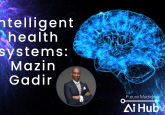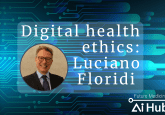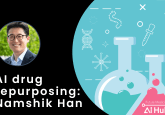Intelligent health systems: an interview with Mazin Gadir
Hello and welcome to the latest podcast episode from Future Medicine AI Hub. I am Emma Hall, the editor of Future Medicine AI Hub. Today, I am joined by Mazin Gadir, who is a digital health expert responsible for overseeing health strategy, development, implementation, execution and transformation as an external advisor for healthcare government ministries and authorities, including for the Dubai Health Authority (UAE). Mazin has unparalleled expertise in the field of intelligent health systems. Thank you for joining us, Mazin. It’s great to have you with us.
To kick this off, could you please provide a brief overview of your career to date?
Yes, absolutely. I have been in the digital health space for the last 23 years. My background, Electronics Electrical Engineer with a PhD in Quantum Electronics and Nanotechnology, specifically for oncology, diagnostic and pre-screening research, and I also did my Masters in Business and Management Studies. All my studies were done in Leeds University (UK), where I started my career in Leeds Uni. Then, I moved into the private sector. I worked for the NHS as part of the Digital Health Team that was assembled to digitize the National Health Services in the UK for 3 years, and then moved to Dubai in 2009. I worked in the digital health space and the healthcare strategy and healthcare digital transformation since 2009 in the region covering Africa, Middle East, Asia and going all the way to Australia.
I worked on governmental duties as well. I worked for Abu Dhabi Healthcare Services Corporation and Dubai Health Authority, the area of digital health strategy, digital health implementation, healthcare strategy and transformation. Also, I worked for private sector companies: the likes of PricewaterhouseCoopers (PwC). I did a number of years in the area of digital health consulting across the region and for a company called Cerner (MO, USA) previously in the digital health transformation. Then, eventually four years ago, I joined a company called IQVIA (NC, USA), trying to also expand the digital health transformation and healthcare strategy development across Africa, Middle East and South Asia. That’s in a nutshell, what I do. I do a number of volunteering activities as well associated with academia.
Wow, you have a lot on your plate!
It’s definitely been an exciting experience, I am a long-life student. I call myself a learning addict.
Thank you for giving us an overview of your career so far. What are intelligent health systems exactly?
Right. An intelligent health system is basically the marriage of digital solutions, data management and data generation, and basically human processes and analytics. Intelligent systems in healthcare basically combine data, technology, systems and processes to make sure that we have a self-learning, modifiable engine that allows decision support mechanisms for clinical staff/ clinical workforces to care for people at the right time, with the right means and with the right amount of information. That’s my definition I guess.
Thank you. Do you think that digital health transformation is a choice or a necessity?
Digital health transformation has become a necessity. It’s part of the DNA of economic prosperity and economic sustainability. We have realized after COVID that healthcare is an important part of any nation’s survivability and sustainability. Number one, it’s a matter of national security, the health of the population and the sustainability and robustness of the healthcare systems. And that’s what COVID has brought us to believe in now that digitization in healthcare has become a necessity. It’s part of the DNA of survivability, sustainability and resilience.
In your opinion, what are some of the best and most successful examples of intelligent health systems or digital healthcare technologies?
I think some countries like Estonia have proven the fact that as a nation, you can build a health system that is part of a national sustainable model that brings all citizens of a country to work together with digital solutions and bring in a smart ecosystem that covers the whole nation with emphasis on healthcare. So, from a perspective of what would be the best or most successful models of digital health or intelligent health systems, I would say the role models of Singapore and Estonia have been one of the leading models across the globe in building an interconnected, easy-to-access model, and one that covers all stakeholders in a digital ecosystem that represents an industry like healthcare.
Certainly, in the Middle East, we have, for example, good initiatives and ambitious initiatives to create such digital health economies. Abu Dhabi is doing a great job. Dubai is doing a great job. Saudi Arabia is definitely working their way towards a very robust digital health economy that allows stakeholders to connect with each other, data to flow seamlessly from one stakeholder to another, create a care coordination model where all the care providers can talk to each other and focus on the well-being and the healthy lifestyle of the citizens and the residents.
So, it’s a human health ecosystem that’s completely comprehensively interconnected and allows a governance model that protects data and protects information and provides equitable accessibility and services that are affordable. That’s why I mentioned Estonia and Singapore because they have managed to bring together all the digital solutions with their partners, with their different stakeholders, with their different major contributors to allow this digital health economy to thrive and build a comprehensive journey through different platforms and different portals and different digital solutions.
The most important part of these ecosystems are the fact you have to build the right standards that they comply to, they have to have the right data and information security and confidentiality policies, and they should include the citizens and the residents in the decision-making by providing consent management and transparent governance. These are some of the examples that I have seen in these countries that I have mentioned. There are some good examples also in the Middle East, the likes of Abu Dhabi, Dubai and Saudi Arabia working towards building a comprehensive and interconnected health ecosystem with intelligent decision-making support systems.
Thank you. It’s interesting that you mentioned Dubai and Saudi Arabia because I feel like I have been seeing a lot of digital healthcare startups everywhere. There has been massive amounts of funding toward those startups in the Middle East. There are quite a few now I think.
That is correct. A lot of the strategies that are coming out of countries like the UAE and Saudi Arabia are to encourage the production and the generation of unicorns, right? So inviting talents, bringing in the startup ecosystem and mindset to thrive with economies. As I mentioned earlier, Covid showed us the importance of healthcare as an industry within a thriving economy. It’s a matter of survivability and resilience. To emphasize this point, the lifeline of any healthcare economy growth are the startup communities, the new ideas and the talent pool that you can grow within one nation.
I believe Saudi Arabia and the UAE have been working hard, in addition to countries like Qatar and Egypt and whatnot, working hard to bring in the power of the youth, the power of the female entrepreneurs to bring in new ideas, innovate and create new solutions and create economies within the healthcare system, whether it’s an area of biotech, medtech, insure tech, female tech and wellness tech and whatnot, to try and thrive with human beings and their health and wellbeing.
As an advisor for healthcare government ministries, what are common challenges that you face from such authorities when executing digital health transformation?
Excellent question. One of the biggest priorities and challenges we have – talent scarcity. The lack of resources and local talents in the area of digital health or healthcare data science or the area of healthcare economics or the area of digital transformation in healthcare. We are in need of talented international resources, as well as local pools of talented boys and girls who can help us in managing the workforce gap. This is number one. I think the other area that we think is a priority, a challenge that can result in a huge priority, is the skilling up of your current workforce, right?
Making sure that this workforce is ready to become the future or the workforce of the future to be equipped with the right skillset, tools, whether it’s citizen development tools, whether it’s emotional intelligence tools, whether it’s leadership tools, because this is a huge gap in the healthcare digital transformation journey that we have. Then, number three, mental health and burnout. This is another important challenge that has created priorities to govern and safeguard the workforce that upholds this huge economy called healthcare, from the digital aspect, from the clinical aspect, from the health economics and finance aspect, and from the strategy and policy development aspect.
The mental health and the burnout rates that we have seen in COVID have shown us that the healthcare workforce is a national security for every nation. A thriving healthcare workforce in any nation shows the robustness and resilience of that nation for any pandemics or epidemics that happen around it. Whether it’s national disasters like what happened in our neighboring countries – Turkey and Syria, whether it’s conflict/disasters, human-created conflicts, the likes of for example Yemen, Sudan and whatnot, your healthcare workforce is one of the biggest national priorities and challenges that you deal with in any healthcare system that you look at in this region.
How do you work to overcome these challenges?
I believe that’s another great question. I mean, some of the solutions could lie in, number one, the education systems. I mean, a lot of the nations are turning inwards to look at how they can speed and accelerate the creation of a new workforce or upskilling the speed of upskilling your current workforce to grow that workforce quickly, internally and locally. So looking at the education system and how this industry can support your healthcare economy to thrive with more and more graduates upskilled and ready to be the workforce of the future skills workforce. So that’s one of the solutions that I have seen in this region.
Another solution is to try and attract talent from the international pool, which is again another important aspect. Creating a safe environment, a secure environment for people to live and grow their families actually attracts a lot of talent into this region. This is another important aspect to grow your workforce and sustain it. Some of the other solutions that I have seen, especially in the third criteria or priority, is the use of digital solutions. Digital solutions allow the tackling of gaps, the scarcity of workforce.
For example, using AI-enabled radiology-focused solutions to try and help radiologists to go through x-rays using AI algorithms or the use of robotic pharmacy dispensing equipment that allows us to obviously tackle the scarcity of pharmacists or using cloud-based solutions that allow less implementation, on-prem implementations, and drives more cloud-based solutions to allow, for example, clinics and hospitals and diagnostic centers to automate their paper-based processes.
The use of digital tools has become, again, another way of solving the scarcity of your workforce, trying to use hyper-automation, RPA (Remote Process Automation), or even now they have used something called hyper legislation to try and bring in clinical governance and clinical policy to catch up with the technological advancement and the huge need for automation. So a few solutions in mind, starting with looking at revamping and revolutionizing your education system to bring in shortening the qualification periods, adding more and more education materials at an early stage, trying to start with schools before even universities. There are a number of areas that could be investigated in the education system.
What policies do you think should be put in place for digital health standards and regulations?
Very good question. I believe it starts with always, number one, data governance and patient confidentiality laws. It always starts with this. Normally, you don’t have to start these policies and regulations from scratch. There are some good examples in GDPR in Europe or HIPAA compliance in the US. I think there are a lot of great international standards that we can bring in to safeguard the data, safeguard the patient confidentiality and information security. That’s number one and the most important, most appropriate area. The area of consent management – who is allowed to see this data? How do you empower your patients, citizens, residents to actually access their data and utilize the data?
Just like banking, we should actually create rules and policies to empower the patients, to consent them and let them enable healthcare users and healthcare custodians of their data to utilize their data. So, empowering the citizens and residents, and we call that patient centricity. So, policies in that norm would normally come definitely at a high priority. The third part is the standards, the coding standards. In digital health, one of the biggest aspects in healthcare digitization is standardizing diagnosis codes, CPTs for procedures, codes for drugs. There’s a lot of coding and a lot of standards that need to be established on a national level.
Again, it doesn’t need to be restarted or started from scratch. You can actually establish these standards and policies and regulations from what other nations have started or have accomplished. There are good national and non-for-profit organizations that could help in establishing that, for example the likes of AHIMA, I think it’s the Association of Health Information Management Accreditation. There is also the Health Information Management System Society. They are a coding organization and status organization. WHO has also published a number of really great standards and guides that mean healthcare systems don’t have to start from scratch. They at least start from a baseline.
Finally, do you have any closing comments?
I think my first focus area, number one, is to look at digital health as an important industry or an important element of an industry that has become a national security and an important economic driver for sustainability and resilience. So, I would definitely invite people to learn more about healthcare systems and digital health specifically, and grow their talent and capabilities in this area. Number two, I believe I would definitely advise people to get connected with associations, the NGOs, the likes of WHO or UNICEF or global organizations that drive digital health awareness and skilling up. I believe also the fact that industries now have become integrated with healthcare.
COVID has shown us that aviation, banking and hospitality cannot survive without being integrated into healthcare as a matter of national security. So, driving awareness and understanding and skilling up in the healthcare system could actually be a priority of all the other industries. Now, there is a huge focus on ESG initiatives (environmental sustainability and governance) and there’s a huge dependency on healthcare that needs to be emphasized. Again, driving awareness, being able to learn, unlearn and learn, drive emotional intelligence, skilling up and leadership skilling up, because these are interconnected competencies that allow you to work in a multitude of industries.
Well, thank you. That’s actually all from me. Thank you so much for speaking with us today, Mazin. It has been really insightful to hear about intelligent health systems and how they can benefit medicine. Thank you also to our listeners and if you would like to hear any more podcasts like this, please head to www.fmai-hub.com.
Interviewee profile:
 Mazin Gadir has unparalleled expertise in the field of Health Information Systems. He is a PhD holder in Quantum Electronics and Nanotechnology in Medical Diagnostics and holds two master degrees: an MSc in Management and Business Administration and a BEng in Electronics and Electrical Engineering from the University of Leeds (UK). He is currently responsible for overseeing health strategy development, implementation, execution and transformation as an External Advisor for healthcare government ministries and authorities, and also holds the position of Director of Client Relationships, Bid Management and Partnerships at IQVIA Payer Provider Government Group.
Mazin Gadir has unparalleled expertise in the field of Health Information Systems. He is a PhD holder in Quantum Electronics and Nanotechnology in Medical Diagnostics and holds two master degrees: an MSc in Management and Business Administration and a BEng in Electronics and Electrical Engineering from the University of Leeds (UK). He is currently responsible for overseeing health strategy development, implementation, execution and transformation as an External Advisor for healthcare government ministries and authorities, and also holds the position of Director of Client Relationships, Bid Management and Partnerships at IQVIA Payer Provider Government Group.
Mazin has worked in Healthcare Transformation Strategy and Digital Health Innovation at several companies, including PriceWaterhouse Coopers PwC (London, UK), Abu Dhabi Healthcare Services Co. SEHA (UAE) and Cerner Limited (MO, USA) accumulating 20 years of experience in the field of healthcare, innovation and transformation. Mazin has also worked as a Senior Consultant at Dubai Health Authority, Organizational Transformation Office. Notable are his 19 years as a management consultant and his depth of experience covered in many global organizations in the UK, France, UAE, KSA, GCC, Australia, India and the USA.





